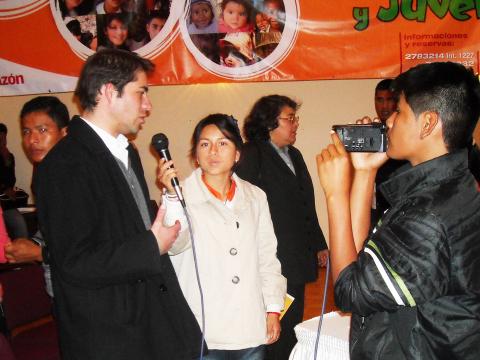CRC@25: Sustainable development and progress is not possible without the participation of children

The most important qualitative change generated by the Convention on the Rights of the Child (CRC) was the shift in the way children and adolescents are viewed. There was a shift from being previously viewed as passive objects of government care and services to human beings with a set of rights. Children became recognised as agents of their own integrated development.
Participation became recognised as a principle in the CRC and as a set of rights, such as the right to access information, join groups and make decisions. According to the CRC, participation also enables the fulfilment of other rights and permits the enforcement of adequate health care, education and protection. It also is an end in itself, making it possible for adults to recognise children as having a genuine voice in the decisions that affect their lives.
25 years ago there was not the same importance given to the participation of children and adolescents and the attention to the issue of participation has been and continues to be gradual. Today, more and more child led organisations are being successful in having their opinions heard. Competitions, fairs, marches and letters to decision makers are some of the mechanisms children are using in different countries. Recently the United Nations has passed the Third Protocol that allows children to submit complaints directly to the UN if their rights are not protected in their country and if they have exhausted all domestic remedies to seek justice.
In Bolivia there are many success stories, especially regarding child participation aimed at generating or modifying public policies. For example, at the national level for many years there existed a Children’s Parliament where children drafted several laws that later became the basis of Bolivian legislation. More recently, the National Union of Bolivian Child Workers have been successful in modifying the reform bill for the Children’s Code, which was approved in July by the Bolivian president.
At the local level, experiences have been rich and diverse. Children have participated in intergenerational assemblies to prepare the Municipal Organic Charters which are statutes governing territorial autonomy and local development. Children are also participating in the creation of laws and municipal regulations, incorporating their proposals into annual operating plans and monitoring health, education and protection services using the methodology Citizen, Voice and Action.
These are just some of the examples of success to be celebrated during the anniversary of the CRC, however, we need to recognise that there are still barriers and challenges. Adult centric attitudes still persist in public authorities and leaders of civil society who believe that children should only play and study. There are also practices of tokenism and instrumentalism where children are used by people or organisations for their own interests.
Therefore, it is important to continue supporting this cause, to institutionalize participatory spaces and to take into account proposals put forth by children. Not as a token gesture or a one off but as a part of a process to strengthen democracy, because at the end of the day there is no sustainable development or progress without the participation of children.
Discover World Vision's CRC@25 blog series.
About the author
Mauricio Otasevic, World Vision’s Bolivia Municipal Public Policy Advisor. Otasevic’s responsibilities include the development and implementation of the local public policy advocacy projects, including lobbying to local governments in order to generate normative, political and budgeting frameworks to promote and strengthen child rights. One of his priorities is to open spaces for the inclusion of girls, boys, adolescents and youth in decision-making processes.